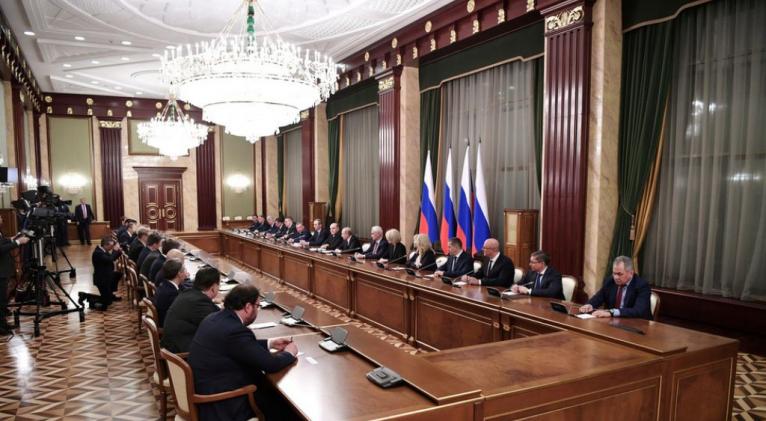New Russian government: Lavrov & Shoigu remain, but PM Mishustin appoints many fresh faces
especiales

Sergey Lavrov and Sergey Shoigu held on to their “big beast” positions, which suggests foreign and defense policy won't change much. The cabinet retained 12 people from the outgoing one and replaced nine positions, bringing down the average age of ministers down to 50 years. Here are the new faces of Mishustin's cabinet.
First Deputy Prime Minister Andrey Belousov (replaces Anton Siluanov) A Muscovite and son of a prominent Soviet economist, the 60-year-old Belousov might have remained a theorist with his degree in economic cybernetics, if not for his 2005 report in which he made several prophetic predictions, including the 2008 financial crisis. He joined the Ministry of Economic Development in 2006 and became its head six years later, before being appointed as an aide to President Vladimir Putin in 2013.
Deputy Prime Ministers
Chief of Staff: Dmitry Grigorenko (instead of Konstantin Chuychenko, who moves to the Ministry of Justice) Born in Siberia, Grigorenko (41) began his career in the southern Krasnodar region. A career taxman, he previously worked with Mishustin at the federal tax service.
Victoria Abramchenko, Alexey Overchuk, Marat Khusnullin, Dmitry Chernyshenko are new deputy PMs, while Yuri Borisov and Tatyana Golikova retained their posts.
Yuri Trutnev remains the Presidential representative to the Far Eastern Federal District.
New Ministers
Culture: Olga Lyubimova (was Vladimir Medinsky) A cultural blue-blood, Lyubimova (39) is the great-granddaughter of the great Russian theatre actor Vasily Kachalov. Her grandfather Vadim Shreubovich ran the Moscow Art Theater where no less a figure than Konstantin Stanislavski was a fan.
A qualified journalist, she worked as a TV correspondent and producer for a number of popular shows and work, before moving to documentary production. She replaces Medinsky, who was a very divisive figure in the world of Russian arts due to his controversial views on movies and comics, as well as a scandal over his doctoral dissertation.
Digital Development, Communications and Mass Media: Maksut Shadaev (replaces Konstantin Noskov) Shadaev, a 40-year-old Muscovite, held a variety of public service posts, before rising to deputy PM of the Moscow Region. In 2018, he moved to Rostelecom, Russia’s largest digital and long-distance telephony provider, to work on digital platforms.
Economic Development: Maxim Reshetnikov (was Maxim Oreshkin) One to watch, Reshetnikov was previously the governor of Perm, where he was highly rated. He's only 40 and has a background in linguistics, mathematics and economics. A Dmitry Medvedev protégé, he worked in the Moscow mayor's office before returning to his home region. In September 2017, he won 82.06 percent of the vote in the gubernatorial election. He replaces the 37-year-old Oreshkin, once deemed the economics “golden boy” but who ultimately failed to boost economic growth in Russia.
Education: Sergey Kravtsov (replaces Olga Vasilyeva) Kravtsov is 45 and a native of Moscow and a former teacher of mathematics and computer science. He previously served as deputy Education minister and was credited with fixing the glitches with Unified State Exam. He replaces Vasilyeva, who was criticized for pushing religion studies and cutting down foreign language classes in school.
Health: Mikhail Murashko (was Veronika Skvortsova) Dr. Murashko (53) hails from Yekaterinburg, and he previously ran the Federal Service for Health Supervision (Roszdravnadzor). A gynecologist, he ran the Ministry of Health in the Komi Republic, and has also edited medical journals. It's hoped that his practical experience as a working doctor will bring a new dynamic to the post. His predecessor’s hospital reforms were heavily criticized.
Justice: Konstantin Chuychenko (was Alexander Konovalov) A former KGB officer, Chuychenko was a classmate of Medvedev's in the Law Department of Leningrad State University back in the 1980s. He spent many years working for Gazprom, while also juggling a role in Medvedev's presidential administration. He stayed there when Putin returned to the Kremlin, working for two years as the government chief of staff.
Labor and Social Protection: Anton Kotyakov (was Maxim Topilin) Kotyakov (39) is from Samara, where he was a precocious youth in the regional administration, rapidly rising in the ranks. In March 2014, he was appointed Minister of Finance of the Moscow Region, before transferring to the post of deputy Finance minister of Russia three years later. He's married, with two children.
Science and Higher Education: Valery Falkov (was Mikhail Kotyukov) Falkov, 41, leaves his post as rector of Tyumen State University to enter the cabinet. He spent four years as a member of the Tyumen Regional Duma (parliament) before joining the Presidential Council on Science and Education in December 2018. This is a big step up.
Sports: Oleg Matytsin (was Pavel Kolobkov) The Muscovite Matytsin is president of the International University Sports Federation and his job will be to restore Russia's battered sporting reputation, with a particular focus on full reinstatement to the Olympics. A former elite table tennis player, he has published more than 80 scientific papers, including seven books.
Returning faces
Sergey Shoigu stays at the helm of Defense, with Sergey Lavrov at Foreign Affairs and Anton Siluanov in Finance. Vladimir Kolokoltsev remains the Minister of the Interior.
Dmitry Patrushev will continue to lead Agriculture. Evgeny Zinichev remains in charge of Civil Defense, Emergencies and Disaster Management (EMERCOM). Energy is headed by Alexander Novak, with Vladimir Yakushev overseeing Construction and Housing & Communal Services.
Denis Manturov remains the Minister of Industry and Trade. Alexander Kozlov stays in charge of Development of the Far East and the Arctic. Dmitry Kobylkin is overseeing Natural Resources and Ecology, while Evgeny Ditrikh kept Transport.
The Ministry of North Caucasus Affairs, held by Sergei Chebotarev, was abolished.













Add new comment